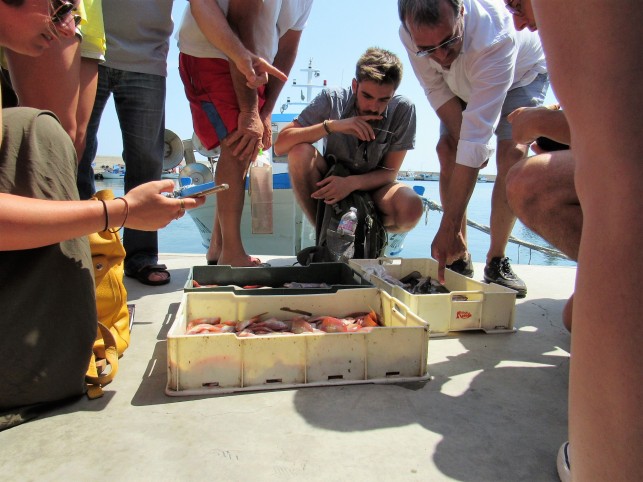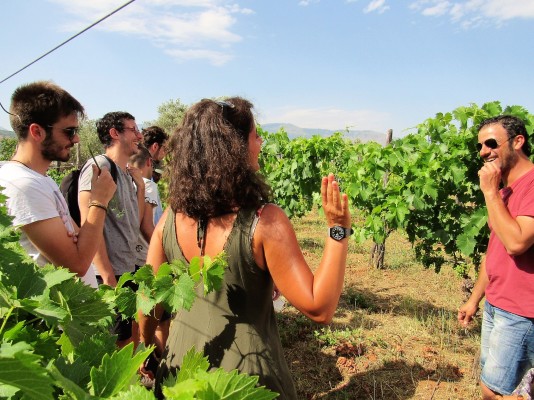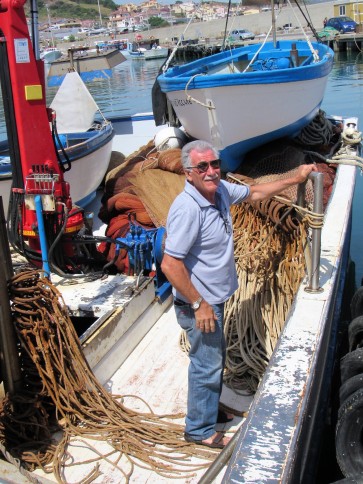 Today, we have a small interlude from the normal Sunday installment of #MeetTheGastronomes, due to our study trip in Calabria all of last week. I was supposed to have something whipped up for you, with someone’s story ready in the wings, but since I don’t, I thought I might explain the gastronomes. Every week they introduce themselves and share their stories, but it dawned on me that many people don’t know what a gastronome is or really what we do here. So think of this week as a backstage look into the life of the gastronomes.
Today, we have a small interlude from the normal Sunday installment of #MeetTheGastronomes, due to our study trip in Calabria all of last week. I was supposed to have something whipped up for you, with someone’s story ready in the wings, but since I don’t, I thought I might explain the gastronomes. Every week they introduce themselves and share their stories, but it dawned on me that many people don’t know what a gastronome is or really what we do here. So think of this week as a backstage look into the life of the gastronomes.
To put it all extremely simply, we eat a lot and are becoming earth loving, food system fixing, always eating hippies. Scrolling through our Instagrams, all you see are dishes or ingredients, our Facebooks are filled with articles about the current food system or the next great chefs, and at least half of us have some sort of business/blog page dedicated to food. The Meet the Gastronomes gives you the stories of who these people are, but what we do here is so much more.
 Personally, I wish that everyone could come to school here and have this experience because in three short months, this place has changed me more than I expected to change in the whole year. So where do I start to explain what we do? Well, we are going to school basically to study the food system of the world and how we can impact it for the better. Our specific course has a focus on the marketing and sustainability of high-quality products, but it also includes things like journalism, legislation, photography, ethnobotany, and many other subjects you never thought of someone having to learn in food class.
Personally, I wish that everyone could come to school here and have this experience because in three short months, this place has changed me more than I expected to change in the whole year. So where do I start to explain what we do? Well, we are going to school basically to study the food system of the world and how we can impact it for the better. Our specific course has a focus on the marketing and sustainability of high-quality products, but it also includes things like journalism, legislation, photography, ethnobotany, and many other subjects you never thought of someone having to learn in food class.
At the foundation, this university is the key to the food world. It is small and not incredibly well known, but the people who do know it see it as the rockstar of food schools. Known as everything from the university of taste, to Slow Food university, to it’s actual name, its filled with people who just love food. There is a bachelor’s program that is more general and includes “normal subjects” in addition to the food related ones. Then there are the masters programs that change specific focuses every year, but generally there is Masters of Wine, Gastronomy, Food Culture & Communication, and a few new programs some years. The school in total only has about 450 students (I had lectures with that many at Boise State), but they’re from over 80 countries.
Like any school, the majority of your classes are generally pretty cool (of course excluding tastings because those are just plain amazing). However, as almost anyone here will tell you, you aren’t here for the academics, you get your value from the environment, experiences and people. But they are taught by experts from all around the world, in three months I’ve had teachers from seven different nations. Over the course of the nine months of classes, we take about thirty different courses, running from 9 to 30+ hours long. We also sit for about twenty different tastings. Courses can be over a few days or a few weeks, most culminating in some sort of project or in few cases, exams. Since they are so short, they are pretty surface level. Generally, we are becoming more well rounded gastronomes than subject experts.

Like I said, the value is in the community and experiences. First and foremost, the people here are incredible. As you’ve seen just in my class, we have a wide range of nations and backgrounds represented. Now multiply that by about 100 and you are closer to what the school is like. There is always someone cooking their traditional food and teaching others how to make it. The experiences of this place, the dinners at the gastronomic society, tastings, study trips, Slow Food events, the producers in the area surrounding school, everything that makes up life in Bra is where you learn the most.
Tastings are insanely amazing. I can always tell when the west coast of America has woken up on tasting days because its about the time I start receiving messages of people’s salivary glands and jealousy kicking into over drive. Each tasting is a different product category and is taught by a producer or expert in the field. We are taught the process of making each product and why the product and its process are each vitally important. We also learn how to conduct a tasting of that product correctly. Most importantly, we learn how to actually taste (which is different from the process of tasting, trust me).
 My favorite part (and part that makes me feel the fanciest) is learning what things you can taste inside a piece of ham, instead of just thinking “this tastes like ham, and oh the next tastes like ham too”. (Basically, the people who taste “notes of oak barrels” in wine, they aren’t that crazy.) The first time I could taste and name the different fruits and flowers present in honey was an insane feeling. I felt like one of the stuck-up wine tasters in the movies, but you really can taste a difference. (I can hear my sister coming up with jokes already) These things, like being able to smell the difference between an artisan and industrial prosciutto product, may not be skills that everyone uses in their life, but they are in mine. It’s a rush to learn tasting skills and think, one day I may be asked to choose what prosciutto to have in my company and I will know from the first smell if a distributor is trying to pull the wool over my eyes.
My favorite part (and part that makes me feel the fanciest) is learning what things you can taste inside a piece of ham, instead of just thinking “this tastes like ham, and oh the next tastes like ham too”. (Basically, the people who taste “notes of oak barrels” in wine, they aren’t that crazy.) The first time I could taste and name the different fruits and flowers present in honey was an insane feeling. I felt like one of the stuck-up wine tasters in the movies, but you really can taste a difference. (I can hear my sister coming up with jokes already) These things, like being able to smell the difference between an artisan and industrial prosciutto product, may not be skills that everyone uses in their life, but they are in mine. It’s a rush to learn tasting skills and think, one day I may be asked to choose what prosciutto to have in my company and I will know from the first smell if a distributor is trying to pull the wool over my eyes.
The study trips are amazing didactic experiences as well. We just went on our first this week (post coming in the next few days) and although I almost melted into a food puddle (imagine being stuffed with food for six days straight, at 40 C/110 F and being the sweatiest human being in the world, yup literally melting.), I am still trying to process all of the information I was given in six short days. Study trips vary for every program, and can be either product focused going to different producers, suppliers, distributors, and restaurants of one product type in an area, or territory focused, seeing typical products of the region and how they are produced and consumed. Overall the university sends students on 120 trips each year. My program has three, one in Italy (region of Calabria), one in Europe (region of Moravia, Czech Republic) and one in the world, (Japan), all territory programs. These experiences provide tons of connections with producers and insights into the areas through the lens of food.
Because it honestly is a pretty bizarre thing to go to school for, you can sort of go on to do whatever you want in the food and beverage industry. I have friends from the bachelors or other master programs at UNISG that are working in everything from sustainable tourism, to corporate kitchen control, to food scouting, to food quality legislation, to one friend who is part of a team maintaining an entirely self-sustaining island north of Denmark. Anything you can dream up having to do with food, you could probably can get a job doing. The problem is that the farther to get into your program and the more of the food world you are exposed to, the more dream jobs you suddenly have.
 Every program at the university has the help of the career office, who sets up interviews, career days, and workshops for narrowing down your dreams and finding a job. Additionally, all the different programs at the university have internship periods. Mine will be at the beginning of 2018, after nine months of classes we have 5 months to intern at least 100 hours or do personal research, while we also write our final thesis. The career office helps you to learn what it is you want to do and find the contacts to do it. They also organize times to meet with different companies to learn more about if it would be a good fit and propose internships.
Every program at the university has the help of the career office, who sets up interviews, career days, and workshops for narrowing down your dreams and finding a job. Additionally, all the different programs at the university have internship periods. Mine will be at the beginning of 2018, after nine months of classes we have 5 months to intern at least 100 hours or do personal research, while we also write our final thesis. The career office helps you to learn what it is you want to do and find the contacts to do it. They also organize times to meet with different companies to learn more about if it would be a good fit and propose internships.
As everyone who talks to me, follows me on social media or has read this blog knows, I love where I go to school and am thankful everyday for the opportunity. There is literally no other way I would ever have gotten half of the experiences I have in the past three months. But more than the experience, I have learned what an impact education can have. In three months of learning, I have experienced some huge perspective shifts.
I have touched on it before, but I never really cared about the state of climate change because I never saw that I had could make an impact for the better or worse. I was focused on the best product, but more interested in it being for the cheapest price. I loved my microwave and ease of access to food. The classes of course, but the environment surrounding Pollenzo and the university have changed all of this. It is why I wish everyone could come take this course and live in Bra.

It’s the beauty in learning new things and from new people. Changing the perspective of climate change off of the red versus blue focused explanations that I was used to in the United States, I could see the facts from my foreign professor and make my own decision. And you know what? My opinions and feelings changed completely, but put me in the middle of the aisle between the parties of my country’s legislators. I finally understood the state of affairs and could make an informed opinion and personal action plan. It was one of my early classes where the lightbulb illuminated.
When we talked about the food system and how broken it is, I wasn’t learning from a TV spot showing me starving children, or a celebrity guest on a documentary complaining about aid going overseas instead of staying at home. I was learning from an educated and worldly man, that understood it from growing up in Kenya, getting schooling abroad and working for Slow Food back in his home country. Again he presented the facts and left us to our own decisions, and again my perspective was shifted. Suddenly my amount of water use and food waste declined dramatically. I became more focused on the food prices as fair for producer as well as myself as the consumer, instead of how much I could fit in my budget.
Life is different in this “Pollenzo bubble” as they call it. After a study trip in the south of Italy, where we saw sustainable and non-sustainable processing and differing opinions on proper production, the bubble makes more sense. We live in the heart of Slow Food, where we learn and shift opinions. But that’s the real gift of the university, the bubble to choose what kind of gastronomes we want to become. It’s a safe space to strengthen perspectives and opinions or completely change others. We live in this environment to realize the number of people who love and care about food as much as we do. Then we leave the bubble to go try to make a difference in this world of food.
-The Very Hungry Traveler

“The bubble to choose what kind of gastronomes we want to become.” I love that. So spot on when it comes to our shared and cherished mission at UniSG. I’m so glad to have you in one of my seminars Molly!
LikeLiked by 1 person
Thank you for taking the time to read my blog….I appreciate a fellow blogger and food lover’s input!!! Thank you for all of the great information and tips on blogging you’re providing in your seminar….I look forward to working with you in the future!
LikeLike